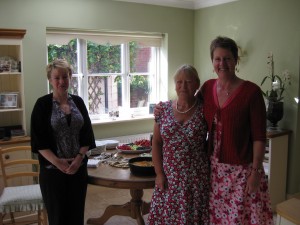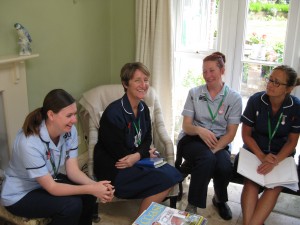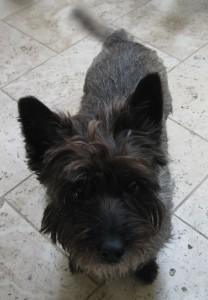
Left to Right: Mandy Williams - Community Midwife, Gay Rogers - Breakfast Host and Hospital Midwife and Luisa Cescutti-Butler, Senior Lecturer (Midwifery)
Every three months hospital and community midwives at Salisbury NHS Trust Hospital attend a forum dedicated to matters relating to Examination of the Newborn (EXON). The aims of the forum are to support healthcare professional undertaking newborn examinations, sharing of experiences/case studies, interprofessional working, maintenance of competence, formulate and review internal processes and peer support for professionals in training. Members consist of midwives, nurses, a consultant Paediatrician and Children’s physiotherapists. BU student midwives are welcome to attend when working with their community midwives and on this occasion two students were present. As unit leader for EXON at BU and one of the link lecturers at the hospital, I chair, coordinate and facilitate the forums, with venues alternating between hospital and community. This month we met for breakfast at a colleague’s home, where midwives were greeted with the smells of freshly brewed coffee and a newly prepared home cooked frittata. Further offerings included fresh strawberries, raspberries, warm croissants, cocktail sausages and quails eggs.
Minutes and agendas are sent out in advance. A standing item is a report from senior children’s physiotherapist Karen Robinson, whose department leads the service for Developmental Dysplasia of the Hips (DDH) in newborns. A recent case was brought to our attention, where a baby had been examined by midwives and doctors and found to have an unstable right hip. The baby was appropriately referred for an ultrasound scan which subsequently found the right hip normal, but considered the left hip abnormal. The Barlow’s and Ortolani manoeuvres used by both professions at the time of the examination had not detected any left hip abnormality. A robust discussion ensured as to the complexities of examining babies for DDH and the difficulties in detecting unstable hips when the manoeuvres used by all professionals were themselves unreliable. However Karen was able to reassure us by indicating that in the seven years of the Children’s Physiotherapy Department leading the DDH service, very few babies had been ‘missed’. Karen also emphasized the significance of caring for babies’ hips in general and the importance of educating parents around their baby’s ‘hip health’. The 3rd year midwifery students are currently taught theory around DDH with opportunities to practice manoeuvres on ‘Baby Hippy’. As facilitator for these sessions I realized that our midwifery curriculum had to include general baby hip health in the first year of the student’s programme. Rachael, a 3rd year student midwife, was in agreement: “the discussion around hip care for newborns was great to listen to. I agree that it would be really beneficial to have a lecture on hip care for students”.

Left to Right: Rachael Callan - 3rd year student midwife, Carol Bremner - Community Midwife, Beccy Seaton-Harris - 1st year student midwife and Fiona White - Community Midwife
On other matters Karen highlighted a number of babies diagnosed with Erb’s Palsy following birth had recently been treated by the department. Various options were offered as to why these babies had sustained these birth injuries, resulting in the forum unanimously agreeing that education around Erb’s Palsy and Brachial Plexus Injuries would benefit all professionals involved with childbirth. Terri Coates, an expert on Brachial Plexus Injuries and a midwife at Salisbury, agreed to arrange a study day with the national Erb’s Palsy Support Group, to be held at either Salisbury Hospital or BU for midwives and students.
There are many advantages in having a regular forum to discuss issues relating to newborn examination. Case studies are presented and debated and education around various topics are provided at regular intervals. The forum also supports midwives from other trusts who are having difficulties with undertaking the examination in their areas. Beccy, the 1st year student midwife had the following to say: “It was very informative. It was good to see community and hospital midwives coming together as a team. I am also interested in learning more about Erb’s Palsy and attending a study day. Learning about general hip care would also be beneficial. The breakfast was lovely too”.
The last bark, I mean word, goes to Dizzy. He gets terribly excited when breakfast is served and runs from one midwife to another hoping for a dropped sausage or at least a titbit from a kind soul. After not having much luck, he eventually settles down and gently snores in the corner of the room.












 SPROUT: From Sustainable Research to Sustainable Research Lives
SPROUT: From Sustainable Research to Sustainable Research Lives BRIAN upgrade and new look
BRIAN upgrade and new look Seeing the fruits of your labour in Bangladesh
Seeing the fruits of your labour in Bangladesh Exploring Embodied Research: Body Map Storytelling Workshop & Research Seminar
Exploring Embodied Research: Body Map Storytelling Workshop & Research Seminar Marking a Milestone: The Swash Channel Wreck Book Launch
Marking a Milestone: The Swash Channel Wreck Book Launch ECR Funding Open Call: Research Culture & Community Grant – Application Deadline Friday 12 December
ECR Funding Open Call: Research Culture & Community Grant – Application Deadline Friday 12 December MSCA Postdoctoral Fellowships 2025 Call
MSCA Postdoctoral Fellowships 2025 Call ERC Advanced Grant 2025 Webinar
ERC Advanced Grant 2025 Webinar Update on UKRO services
Update on UKRO services European research project exploring use of ‘virtual twins’ to better manage metabolic associated fatty liver disease
European research project exploring use of ‘virtual twins’ to better manage metabolic associated fatty liver disease